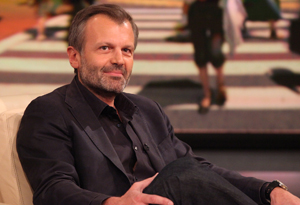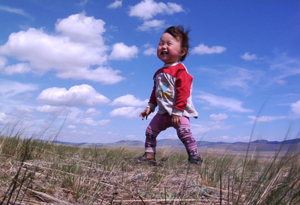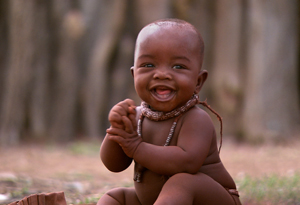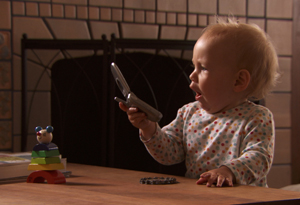Baby Talk

It's not often that a documentary with no narration, subtitles or dialogue steals the hearts of millions of moviegoers. But put four adorable infants on the big screen and you might just have a shot. The new documentary film Babies tracks the entire first year in the lives of four babies around the world, from birth to first steps.
Director Thomas Balmes spent nearly two years traveling the globe to capture the early lives of Bayarjargal from Mongolia, Ponijao from Namibia, Mari from Japan and Hattie from the United States. The idea, he says, came to him five years ago from a French producer. "[He said], 'Why don't we do a wildlife documentary on babies?' Well, I said, 'What is this crazy idea?' And then the more I was thinking about it, the more I thought there could be something done about it."
Thomas says one of the best things about the film is that the cooing of babies is a universal language. "The other day, I had a 15-year-old Chinese woman come up to me [and say], 'This is the very first time I'm going to bring my grandmother, who doesn't speak a word of English, to the movie theater,'" he says. "Anyone can watch it because there is not a single dialogue, not a single narration. You are, for 80 minutes, only with the babies and their perspective. You see the world through their eyes, and you almost have no adult in the scene."
Director Thomas Balmes spent nearly two years traveling the globe to capture the early lives of Bayarjargal from Mongolia, Ponijao from Namibia, Mari from Japan and Hattie from the United States. The idea, he says, came to him five years ago from a French producer. "[He said], 'Why don't we do a wildlife documentary on babies?' Well, I said, 'What is this crazy idea?' And then the more I was thinking about it, the more I thought there could be something done about it."
Thomas says one of the best things about the film is that the cooing of babies is a universal language. "The other day, I had a 15-year-old Chinese woman come up to me [and say], 'This is the very first time I'm going to bring my grandmother, who doesn't speak a word of English, to the movie theater,'" he says. "Anyone can watch it because there is not a single dialogue, not a single narration. You are, for 80 minutes, only with the babies and their perspective. You see the world through their eyes, and you almost have no adult in the scene."

Shooting Babies taught Thomas a few lessons in parenting, he says. "I'm trying to be less materialistic with my kids, not bring them so many toys. To be really just there, me alone with no phone or computer between us," he says. "Like the Japanese father [who is on the phone] when he's taking care of the little girl? We're all doing that."
Oprah says the film changed her perspective of which nations provide the ideal lifestyle early in life. "When I first watched it I thought, 'Gosh, I want to be Hattie, in that little jumping-up-and-down thing and going to yoga class,'" she says. "And by the end, I thought the African baby out in the wilderness being free had a lot of advantages."
In one scene, Bayarjargal from Mongolia is alone, surrounded by cows. Oprah says she couldn't believe that no one intervened. "I'm thinking, 'Well, is somebody going to stop the cow?' I couldn't believe it!"
Thomas says he made very clear to the parents that he was a filmmaker not a babysitter. "I was enjoying the moment knowing I had a great piece of cinema. I was not [worried] because the mother was not very far away. She was fine. If she was cool, I was cool," he says. "I almost never interfered. If something crazy would ever happen, I would have." Thomas says there were no safety problems during the filming because the babies surrounded by animals grew up living with them.
Oprah says the film changed her perspective of which nations provide the ideal lifestyle early in life. "When I first watched it I thought, 'Gosh, I want to be Hattie, in that little jumping-up-and-down thing and going to yoga class,'" she says. "And by the end, I thought the African baby out in the wilderness being free had a lot of advantages."
In one scene, Bayarjargal from Mongolia is alone, surrounded by cows. Oprah says she couldn't believe that no one intervened. "I'm thinking, 'Well, is somebody going to stop the cow?' I couldn't believe it!"
Thomas says he made very clear to the parents that he was a filmmaker not a babysitter. "I was enjoying the moment knowing I had a great piece of cinema. I was not [worried] because the mother was not very far away. She was fine. If she was cool, I was cool," he says. "I almost never interfered. If something crazy would ever happen, I would have." Thomas says there were no safety problems during the filming because the babies surrounded by animals grew up living with them.

When choosing the four families featured in Babies, Thomas says there was only one requirement: love. "I didn't want a poor African baby or a rich American baby. I wanted four loving parents," he says. "What I realized, and you realize in the film [is] whatever the environment is, the basic needs are fulfilled. As long as there is love, the baby goes well."
Thomas also purposely chose four families who live extremely differently. "I wanted [the Namibian family] to be totally disconnected from everything we know and that we consider as wealth and comfort and just to see that they could be happy and grow in a beautiful way," he says. "I was looking for a full level of technology relationship from the science-fiction atmosphere of Tokyo, which is where I think we will be in 50 years."
Thomas also purposely chose four families who live extremely differently. "I wanted [the Namibian family] to be totally disconnected from everything we know and that we consider as wealth and comfort and just to see that they could be happy and grow in a beautiful way," he says. "I was looking for a full level of technology relationship from the science-fiction atmosphere of Tokyo, which is where I think we will be in 50 years."

Hattie, the American infant featured in Babies, is now 4 years old and lives in Oakland, California. Her father, Fraser, says one of the best parts of being involved with the film is having the beginning of his daughter's life on tape. "I would have shot a lot of home movies anyway, but this way I shot 100 hours of home movies," he says.
Susie, Hattie's mother, says she was moved by the similarities between mothers all around the world. "If only we had the acres and acres and Hattie could just be running free right now," she says. "That's one of the things that made me kind of wistful for an opportunity in some ways to live like that, but also recognizing we all do what we can in our circumstances to make the most to love our kids."
Thomas says this movie is just the beginning. "It's a starting point to thinking and just reading books about different cultures, taking a plane ticket and going to Namibia and just understanding that there is not one way of doing things, but there are many ways," she says. "It's so interesting to see what other people do, and I think we can learn from that."
Susie, Hattie's mother, says she was moved by the similarities between mothers all around the world. "If only we had the acres and acres and Hattie could just be running free right now," she says. "That's one of the things that made me kind of wistful for an opportunity in some ways to live like that, but also recognizing we all do what we can in our circumstances to make the most to love our kids."
Thomas says this movie is just the beginning. "It's a starting point to thinking and just reading books about different cultures, taking a plane ticket and going to Namibia and just understanding that there is not one way of doing things, but there are many ways," she says. "It's so interesting to see what other people do, and I think we can learn from that."



